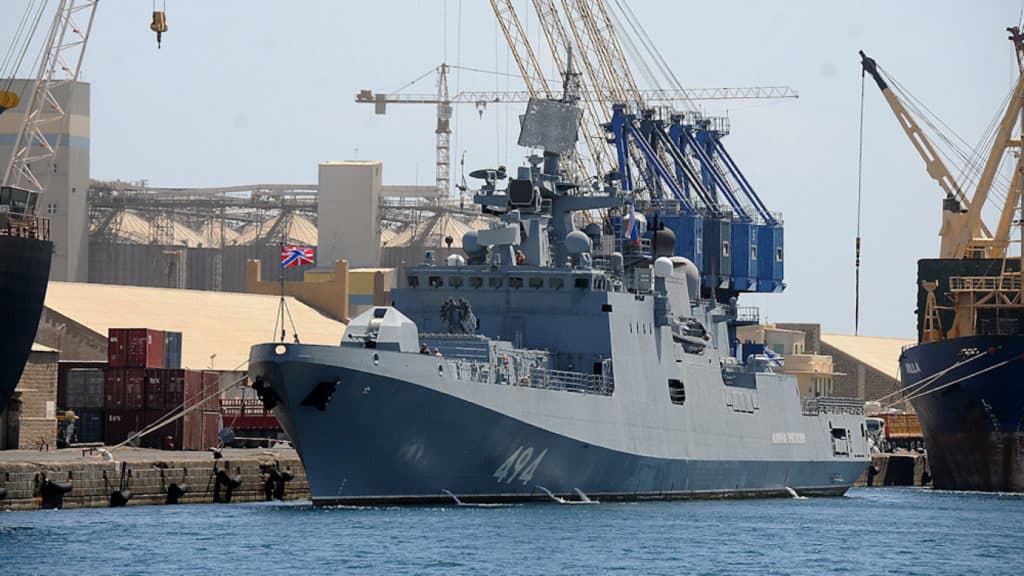By René Tebel
Last December, Russia unveiled its plan to open a naval base in the African nation of Sudan. Now there are growing indications that the Sudanese government wants to modify the plans.

After the end of the Soviet Union, Russia’s geopolitical importance shrank to the status of a political dwarf. Vladimir Putin has been trying to change this since he first took office in 1999. His greatest success to date has been his Syria policy: In addition to extending the lease of the Russian naval base in Tartus, Russia, as Assad’s ally in the Syrian proxy war, also gained possession of the Hmeimin air base near the Syrian Mediterranean coast.
Putin’s global ambition
For his global ambitions, Putin relies primarily on states with which the USSR had friendly relations and on governments that the U.S. and the West consider to be close to terrorist states and subject to sanctions. In keeping with the French saying that the enemy of my enemy is my friend, Sudanese President Umar al-Bashir secured Russian support in 2017 to modernize the Sudanese military. In Sochi, al-Bashir likewise addressed the construction of a Russian base. But it was not until late 2019 that a Russian document was released that specified Moscow’s plans in Sudan.
The base in Port Sudan
According to the document, the technical support facility will be built on the northern outskirts of Port Sudan and will be able to hold four warships – including nuclear-powered ones. According to the agreement, the 25- year lease period will be automatically extended for another 10 years unless either party opposes a continuation.
Red Sea base in Putin’s geopolitical chess game
A naval base could not only greatly facilitate logistics for Russian warships in the Horn of Africa region. A base would also bring several geographical advantages to the Russian military: Port Sudan, for example, is located on one of the world’s most important sea routes, connecting the Indian Ocean with the Mediterranean through the Red Sea and the Suez Canal. Russia could also use the base as a political gateway to Africa.
The most important reason for Russia, however, may lie in another concern: Unnoticed by the world public, a race is currently taking place in Africa among the powers to secure or expand their economic and military influence.
For example, East Africa is home to numerous foreign military bases, which are sometimes not an half an hour drive apart on a main road. In Djibouti alone, with an area about the size of Slovenia or Belize, there are major bases operated by the U.S. and France, as well as Japanese, Chinese, German, Italian and Spanish military installations. In Somalia, the U.S., U.K., United Arab Emirates and Turkey operate bases, while Kenya has British and U.S. bases. In Sudan’s eastern neighbor Eritrea, in turn, Israel and the United Arab Emirates have established bases.
Sudan thus represents a geopolitical lifeline in Russia’s calculus and a pearl in a future chain of bases in Eritrea, the Central African Republic, Madagascar, and Mozambique.
Is the U.S. obstructing Russia’s plan?
Apparently, however, the U.S. is putting pressure on Sudan, which is why it suspended Russian-Sudanese plans as recently as late April, according to a Sudanese military official cited in the National News. The Russian Embassy in Karthum immediately denied it.
The first indication that the United States is seeking to prevent Russian involvement comes from an incident that occurred in February: On Feb. 26, a Russian warship visited Port Sudan for the first time. However, a few days before the Admiral Grigorovich (Pennant number 494), the USNC Carson City (T-EPF-7) docked in Port Sudan, a day after the Russian frigate the guided missile destroyer US.
The big dilemma : Fresh money or old alliance?
Moreover, Western-oriented states are luring Sudan with access to fresh money. Umar al-Bashir’s Islamist dictatorship left Sudan with $60 billion in foreign debt and 300 per cent inflation when it fell in 2019. For the constitutional declaration (August 2019), the signing of a peace agreement with South Sudan (October 2020), normalisation of its relations with Israel (October 2020), removal from the US list of states that support terror (December 2020) and a new government (February 2021), the 30-odd years of isolation that ultimately led to the Sudan Conference in Paris in May and Sudan’s ongoing debt relief ended.
To get access to fresh money, Sudan must reduce its multilateral arrears. With the US and the UK already providing a bridge loan for arrears to the World Bank and the African Development Bank, according to Bloomberg, France is providing another $1.5 billion as a bridge loan for payments to the International Monetary Fund. This enabled Sudan to clear the most important hurdle for inclusion in the HIPC Initiative of the World Bank and the International Monetary Fund at the end of June.
As encouraging as the development is for Sudan, it also puts the country in a quandary. The government in Khartoum does not want to jeopardize the budding friendly relations with the United States. However, their geopolitical goals categorically rule out Russia’s gaining a foothold in Africa and the Horn of Africa. On the other hand, Sudan is one of the most important buyers of Soviet and Russian arms in Africa, and the two states have a longstanding friendly relationship.
Thus, Sudan appears to be seeking a compromise as a way out so as not to antagonize either side. As Chief of General Staff Mohamed Othman al-Hussein told Blue Nile TV, according to Aljazeera, the treaty with Russia should be renegotiated. This statement can probably be interpreted to mean that the base is likely to emerge, but on a much smaller scale than Russia intends.
Author: René Tebel – Doctorate in maritime and cartographic history. He researched and taught at the University of Vienna and is the author of numerous scientific articles. His geopolitical analyses are published mainly in Austria, Switzerland and the Arab world. His research interests include current and future geopolitical hotspots as well as military developments.
(The views expressed in this article belong only to the author and do not necessarily reflect the editorial policy or views of World Geostrategic Insights).
Image Source: The Moscow Time







